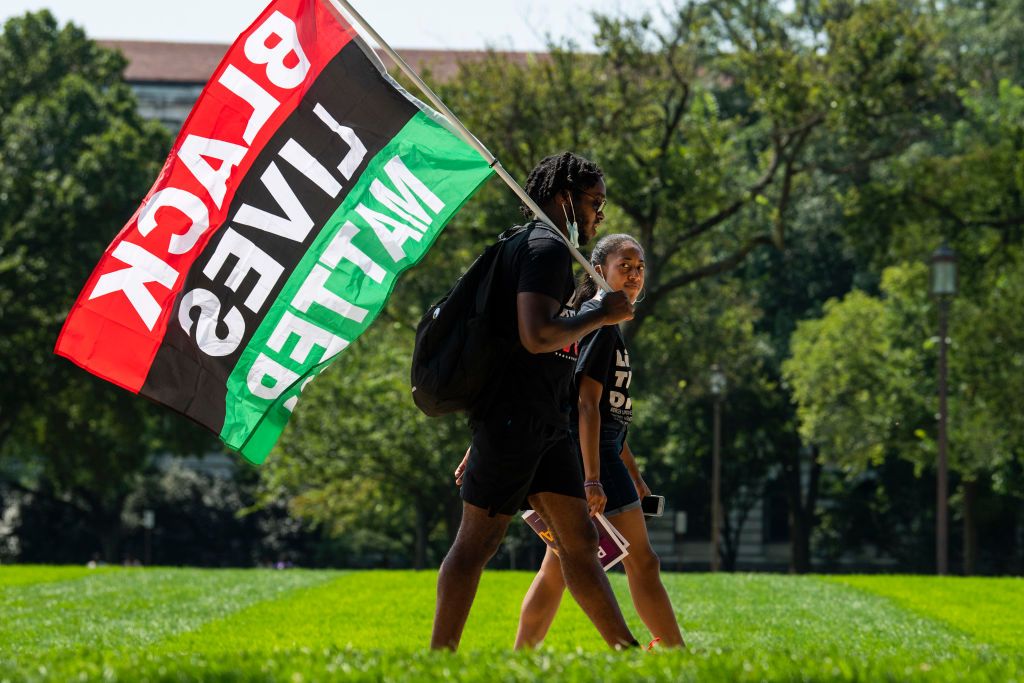20 Years After 9/11 Black Communities Bear The Burden of Surveillance
Source: Tom Williams / Getty
Twenty years after 9/11 and the surveillance apparatus continues to traumatize Black and other communities of color. I remember in the immediate aftermath of 9/11 thinking about the movie “The Siege.”
It was a favorite in our household. What Denzel movie isn’t? Released three years before 9/11, Denzel Washington’s “The Siege” painted a picture of what could happen to Black and other Muslims in the tri-state area if another major attack happened on U.S. soil.
While 9/11 did not result in the mass internment of Black and other Muslims in New York City, it did usher in a new age of tactics weaponized against our communities. A 2017 article in the Boston Review described the intersection of being Black and Muslim post-9/11.
“To be a black Muslim today is to be part of wide cross-section of U.S. Muslims of African descent, U.S.-born and immigrants, who are subjected to a double burden of state violence: as black people and as Muslims,” read the article. “They are subjected to the war on crime and the War on Terror, to surveillance, aggressive policing, and systematic civil rights violations.”
That increase in surveillance, aggressive policing, and systematic civil rights violations wasn’t just limited to Black Muslims. Black communities across the board experienced the impact of the increased militarization of police departments across the country and over-reliance on surveillance measures.
And police departments across the country benefited from surplus military gear long before 9/11. The War on Drugs was followed by tough-on-crime policies of the 1990s armed police departments. But after 9/11, the increased capabilities, including coordination with big tech to exploit user information across sites to target organizers of color, exploded.
SCOOP: Emails show that the LAPD
worked w/ Dataminr — a controversial social media surveillance company — during the #GeorgeFloyd protests. The LAPD has previously denied using the system to track BLM protests. @LATACOhttps://t.co/vr4f2lFWvP
— Lexis-Olivier Ray (@ShotOn35mm) September 3, 2021
Under the cover of “domestic security,” local law enforcement agencies have been found to use these tactics against Black and Brown communities. The L.A. Taco recently reported the Los Angeles Police Department collaborating with the tech company Dataminr to “monitor” racial justice activists during protests last summer.
Dataminr is one of several companies that have come under fire for aiding in the social monitoring of activists and people who attend protests. As the Brennan Center documented last year, monitoring social media led people to be incorrectly tagged as gang members in unreliable registries.
9/11 was a horrific trauma.
For Muslim, Black, and brown communities in the US and abroad, it’s two traumas:
The day itself, and the #20YearsSince of war and surveillance backed by Big Tech that followed.
Learn more here: https://t.co/y5T3HYf4Ut #BigTechSellsWar
— ACRE (@ACREcampaigns) September 10, 2021
Facial recognition and gunshot detection systems are just two of the ways big technology continues to lay siege to Black communities. A recent campaign launched by the Action Center on Race and the Economy highlights the intersection of big tech and the global war on terror. An earlier report from the Action Center dug into the rise and reach of surveillance technology as a part of 21st century policing.
“Adopted for use as police ‘reforms,’ sophisticated electronics and tech capabilities do not address the unchecked power and ballooning budgets of local police departments,” read an overview to the report. “Instead, they open the door for law enforcement to monitor communities while private companies profit from sales and contracts.”
According to a report from the Movement for Black Lives, the federal government intervened in over 300 cases between August 2020 and October 2020 involving people arrested during racial justice protests. Under the prior administration, Black and other organizers committed to racial justice were treated as enemy number one, escalating prior government action.
Related to government actions to criminalize protest, Florida’s Republican-controlled legislature took extreme measures. Earlier this week, a federal judge issued a preliminary injunction blocking the Florida anti-protest from going into effect for the time being. Passed under the guise of preventing attacks on democracy like the Jan. 6 Capitol attack, such legislation was squarely aimed at Black protestors.
AND WE WON’T STOP!! A #Florida judge granted a preliminary injunction blocking #HB1!! pic.twitter.com/j9pYMinSlS
— Dream Defenders (@Dreamdefenders) September 9, 2021
While seemingly different instances, all the examples discussed herein are connected by the larger thread of weaponized fear post-9/11, from the federal government on down, unchecked power in the name of “domestic security” and “public safety” has allowed for the monster to grow.
As another year of commemoration goes by and more ‘Never forget’ messages are posted, we shouldn’t forget that part of the legacy that continues to inflict unbalanced attacks on Black and other communities experiencing injustice. The trauma and horror felt 20 years ago cannot be used to justify turning a blind eye to the ongoing attacks that target people in the present.
See Also:
9/11 Broke Me, And It Took Over A Decade To Heal
Remembering The Unsung Heroes Of Color From 9/11
[ione_media_gallery id=”4204159″ overlay=”true”]

